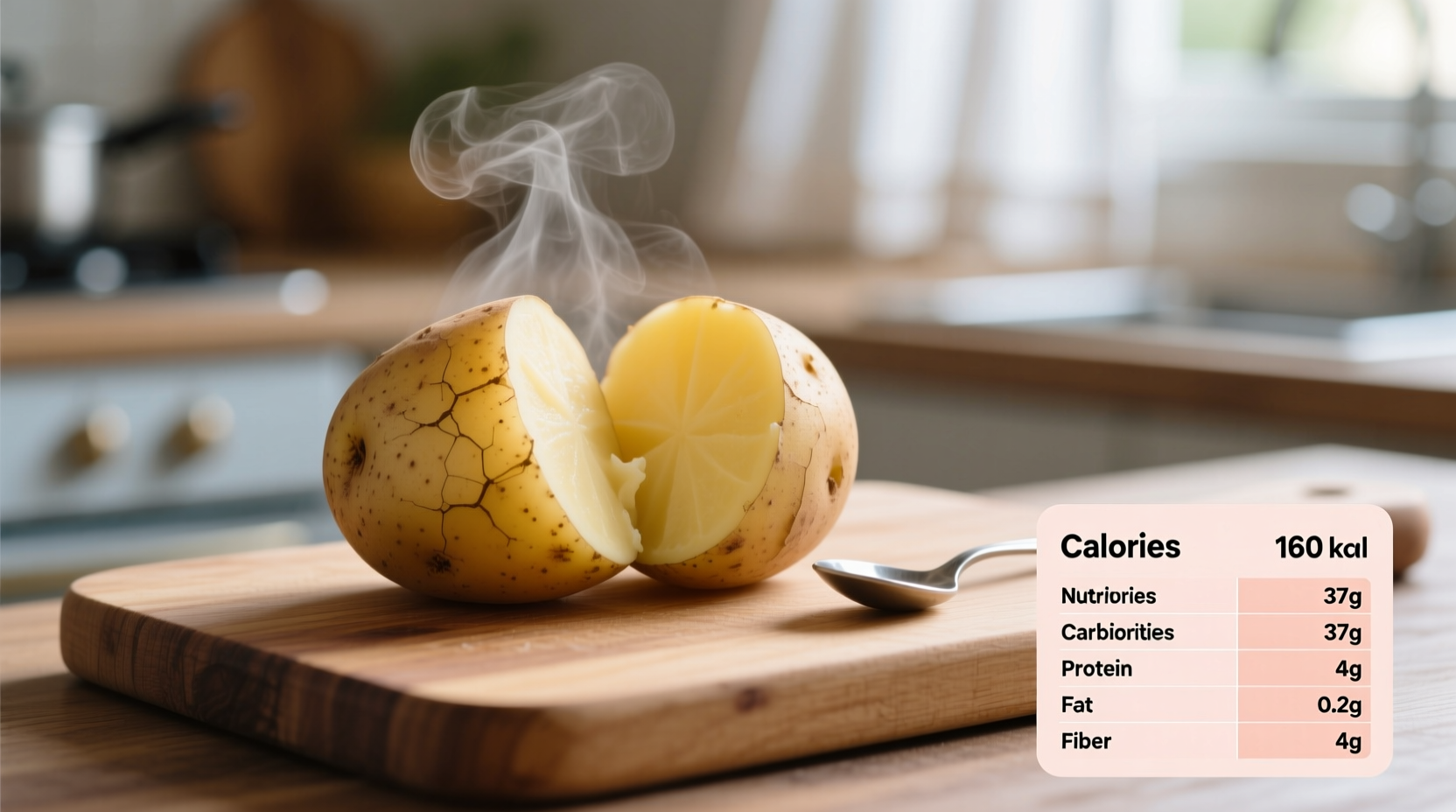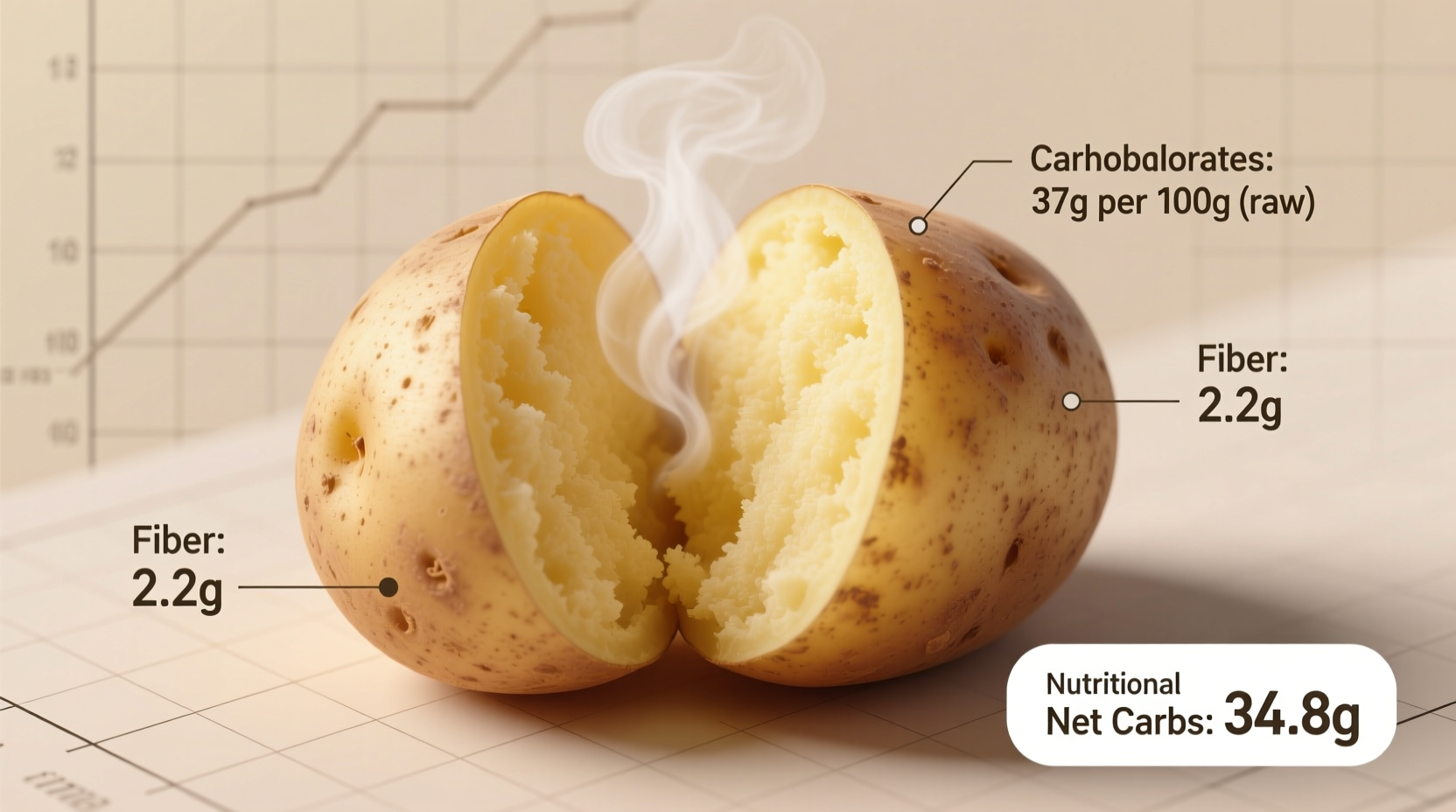Understanding the carbohydrate content in potatoes is essential for anyone managing their diet, whether for weight control, diabetes management, or athletic performance. Potatoes often get misunderstood in nutritional discussions, but when you know exactly what you're consuming, they can be a valuable part of a balanced diet. Let's explore the facts behind potato carbohydrates with data you can trust.
Why Potato Carbohydrate Information Matters
Carbohydrates are your body's primary energy source, but the type and amount matter significantly for different health goals. Potatoes contain complex carbohydrates that provide sustained energy, along with valuable fiber, vitamins, and minerals. However, the exact carb count varies based on several factors that many people overlook when tracking their intake.
According to the USDA FoodData Central, the official nutrition database of the United States Department of Agriculture, potato carbohydrate content isn't a one-size-fits-all number. This government resource provides the most reliable, science-backed nutritional information available to consumers.
Potato Varieties and Their Carbohydrate Profiles
Not all potatoes are created equal when it comes to carbohydrate content. The variety you choose significantly impacts your nutritional intake. Here's a detailed comparison of common potato types based on 100-gram servings:
| Potato Variety | Total Carbohydrates (per 100g) | Dietary Fiber | Sugars | Glycemic Index |
|---|---|---|---|---|
| Russet (boiled) | 17.5g | 2.2g | 0.6g | 85 |
| Sweet Potato (boiled) | 20.1g | 3.0g | 4.2g | 44 |
| Red Potato (boiled) | 15.1g | 2.0g | 0.9g | 89 |
| Yukon Gold (boiled) | 15.9g | 2.0g | 0.6g | 78 |
| Purple Potato (boiled) | 14.2g | 2.3g | 0.5g | 77 |
This comparison of different potato varieties shows significant differences in carbohydrate composition. Sweet potatoes contain more total carbohydrates than white potatoes but have a much lower glycemic index due to their higher fiber and complex carbohydrate structure. Purple potatoes offer the lowest total carbohydrate content among common varieties while providing additional antioxidant benefits.

How Preparation Methods Change Carbohydrate Content
The way you prepare potatoes dramatically affects their carbohydrate profile and how your body processes them. Many people don't realize that cooking methods can alter both the total carb count and the glycemic response:
- Boiling: Retains most carbohydrates but increases water content, slightly reducing carb density per serving. Cooling boiled potatoes increases resistant starch by up to 28%, which functions as fiber in your digestive system.
- Baking: Concentrates carbohydrates as water evaporates, resulting in higher carb density per gram compared to boiled potatoes.
- Frying: Adds significant fat content but doesn't substantially change the carbohydrate count. However, the fat slows digestion, potentially lowering the glycemic response.
- Microwaving: Preserves nutrients well with minimal change to carbohydrate structure.
According to research published in the American Journal of Clinical Nutrition, cooling cooked potatoes creates resistant starch that acts more like fiber than digestible carbohydrate, reducing the effective carb count by 15-25% for metabolic purposes. This explains why potato salad often has less impact on blood sugar than hot mashed potatoes.
Practical Applications for Different Dietary Needs
Understanding potato carbohydrates isn't just about numbers—it's about applying this knowledge to your specific health goals:
For Weight Management
Potatoes provide satiety due to their high water and fiber content. A medium potato contains only about 110 calories but keeps you feeling full longer than many processed carbohydrate sources. The key is portion control and preparation method—baked or boiled potatoes with skin provide more fiber than peeled or fried versions.
For Diabetes Management
The American Diabetes Association recommends considering both total carbohydrates and glycemic load. While Russet potatoes have a high glycemic index (85), pairing them with protein and healthy fats can reduce their blood sugar impact. Sweet potatoes generally offer a better option for blood sugar management due to their lower glycemic index (44) and higher fiber content.
For Athletic Performance
Athletes often use potatoes as a clean carbohydrate source for glycogen replenishment. The complex carbohydrates in potatoes provide sustained energy release, especially when consumed with the skin for additional fiber. Many endurance athletes prefer sweet potatoes for their additional vitamin A content, which supports immune function during intense training periods.
Common Misconceptions About Potato Carbohydrates
Several myths persist about potato carbohydrates that can lead to unnecessary dietary restrictions:
- Myth: All potatoes are high glycemic and should be avoided.
Fact: While some varieties have high glycemic indexes, preparation methods and food pairings significantly impact blood sugar response. - Myth: Potatoes have no nutritional value beyond carbohydrates.
Fact: Potatoes are excellent sources of vitamin C, potassium, and B vitamins, especially when consumed with the skin. - Myth: Sweet potatoes are always a better choice than white potatoes.
Fact: Both have nutritional benefits; the best choice depends on your specific dietary needs and goals.
When tracking carbohydrates in your diet, remember that the skin contains significant fiber—peeling potatoes reduces fiber content by up to 50%. The Centers for Disease Control and Prevention emphasizes that fiber is crucial for digestive health and should be counted separately from net carbohydrates for those monitoring their intake.
Putting Potato Carbs in Context
Understanding how potato carbohydrates compare to other common foods helps put the numbers in perspective:
- 1 medium potato (150g) = 26g carbs ≈ 1.5 slices of bread
- 1 cup mashed potatoes = 28g carbs ≈ 1/2 cup cooked rice
- 1 medium sweet potato = 24g carbs ≈ 1 small banana
Unlike many processed carbohydrate sources, potatoes provide these carbohydrates alongside significant potassium (more than a banana), vitamin C, and other nutrients. This nutrient density makes them a valuable component of balanced eating patterns when consumed in appropriate portions.
Practical Tips for Managing Potato Carbohydrates
Here are actionable strategies for incorporating potatoes into your diet while managing carbohydrate intake:
- Always weigh potatoes raw for accurate carb counting, as cooking changes water content
- Leave the skin on to maximize fiber content and reduce net carbohydrates
- Cool cooked potatoes to increase resistant starch content by up to 28%
- Pair potatoes with protein and healthy fats to moderate blood sugar response
- Choose smaller portions of higher-carb varieties or larger portions of lower-carb options
- Track your personal response to different potato types and preparations
Remember that individual responses to carbohydrates vary significantly. The best approach is to monitor how your body responds to different potato preparations and adjust accordingly. For personalized guidance, consult a registered dietitian who can help you incorporate potatoes into your specific dietary pattern.
Frequently Asked Questions
Do potatoes have more carbohydrates than rice?
A medium potato (150g) contains about 26g of carbohydrates, similar to 1/2 cup of cooked white rice (22g). However, potatoes generally provide more potassium and vitamin C than rice.
How many net carbs are in a potato?
Net carbs = total carbs minus fiber. A medium Russet potato has 26g total carbs and 2g fiber, resulting in 24g net carbs. Sweet potatoes have 24g total carbs and 3.8g fiber, yielding 20.2g net carbs.
Does boiling potatoes remove carbohydrates?
Boiling doesn't remove significant carbohydrates, but it does cause some leaching into the water. Cooling boiled potatoes increases resistant starch, which functions as fiber rather than digestible carbohydrate.
Are sweet potatoes lower in carbohydrates than white potatoes?
Per 100g, sweet potatoes contain slightly more total carbohydrates (20.1g) than white potatoes (15-17g), but they have more fiber and a much lower glycemic index, making them a better option for blood sugar management.
How does potato preparation affect blood sugar levels?
Cooling cooked potatoes increases resistant starch by up to 28%, reducing blood sugar impact. Pairing potatoes with protein, fat, or vinegar can lower the glycemic response by 20-35% compared to eating potatoes alone.











 浙公网安备
33010002000092号
浙公网安备
33010002000092号 浙B2-20120091-4
浙B2-20120091-4